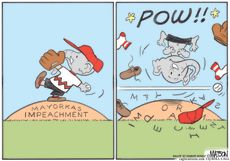In defense of the big banks
The argument for breaking up big banks may be “simple and sound-bite-ready,” but every part of it is “based on a fallacy.”
William B. Harrison Jr.
The New York Times
The argument for breaking up big banks may be “simple and sound-bite-ready,” said William B. Harrison Jr., the former head of JPMorgan Chase, but every part of it is “based on a fallacy.” Critics say there was something unnatural about combining commercial and investment banking to create universal banks over the past decade. In fact, bank consolidation “was driven by the market’s needs” and has provided far greater efficiency to customers. In the financial crisis, remember, “none of the first institutions to fail”-—Countrywide Financial, Bear Stearns, Lehman Brothers-—were universal banks. Nor are large institutions too risky and complex: It’s mostly smaller firms like MF Global and Knight Capital that have spectacularly failed to manage risk. Actually, “complexity can be an antidote to risk,” since a large bank’s diversified activities help cushion it against losses in any one division. It’s also “just false” to say that banks have undue political power; regulators make independent judgments all the time. By fostering “more innovation, greater convenience, and consistent, reliable service,” large banks give the U.S. a competitive edge it “can’t afford to lose.”
Subscribe to The Week
Escape your echo chamber. Get the facts behind the news, plus analysis from multiple perspectives.

Sign up for The Week's Free Newsletters
From our morning news briefing to a weekly Good News Newsletter, get the best of The Week delivered directly to your inbox.
From our morning news briefing to a weekly Good News Newsletter, get the best of The Week delivered directly to your inbox.
Sign up for Today's Best Articles in your inbox
A free daily email with the biggest news stories of the day – and the best features from TheWeek.com
Create an account with the same email registered to your subscription to unlock access.
-
 'A speaker courageous enough to stand up to the extremists in his own party'
'A speaker courageous enough to stand up to the extremists in his own party'Instant Opinion Opinion, comment and editorials of the day
By Harold Maass, The Week US Published
-
 How could the Supreme Court's Fischer v. US case impact the other Jan 6. trials including Trump's?
How could the Supreme Court's Fischer v. US case impact the other Jan 6. trials including Trump's?Today's Big Question A former Pennsylvania cop might hold the key to a major upheaval in how the courts treat the Capitol riot — and its alleged instigator
By Rafi Schwartz, The Week US Published
-
 Today's political cartoons - April 18, 2024
Today's political cartoons - April 18, 2024Cartoons Thursday's cartoons - impeachment Peanuts, record-breaking temperatures, and more
By The Week US Published
-
Issue of the week: Car dealers’ showdown with Tesla
feature Tesla's direct-sale business model is coming under fire in New Jersey and many other states.
By The Week Staff Last updated
-
Issue of the week: Has Washington defeated Wall Street?
feature The Dodd-Frank Act forced banks to sell off “many of their classic ‘Wall Street’ businesses. How are the banks doing?
By The Week Staff Last updated
-
Issue of the week: Is 2014 the recovery year?
feature Economic forecasters generally think 2014 will “be a breakout year” for the U.S. economy.
By The Week Staff Last updated
-
Issue of the week: Signs of a true recovery
feature Could the economy finally be back on track?
By The Week Staff Last updated
-
Issue of the week: The economy’s new normal
feature Are we in “a permanent slump?”
By The Week Staff Last updated
-
Issue of the week: When is inflation just right?
feature Though it has been battled in past decades, some economists believe a little inflation is good for a weak economy.
By The Week Staff Last updated
-
Issue of the week: The rise of a part-time economy
feature The economy has created new jobs for the 34th month in a row, but most of them are low-paid and part-time.
By The Week Staff Last updated
-
Issue of the week: A disappointing jobs report
feature The economy added just 88,000 jobs in March, less than half of Wall Street’s expectations.
By The Week Staff Last updated